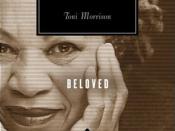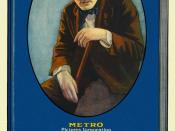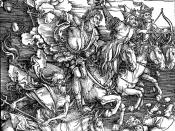It is always evident that under situations of extreme stress people find themselves committing actions with irreparable ramifications. In Toni MorrisonÃÂs novel Beloved, a flashback involving four white riders, schools teacher, his nephew, a slave catcher and sheriff, ride authoritatively toward 124 Bluestone Road. The riders survey the family scene with care because of the value of the slaves. ÃÂThe four horsemenÃÂ refers to the Four Horsemen of the Apocalypse (Famine, War, Pestilence, Death) as described in the Bible. Their arrival signifies the end of the world, just as schoolteacher and his envoys also signify the end of SetheÃÂs twenty-eight days of happiness. Sethe experiences twenty eight days of utopia in which 124 is fully alive with no animosity towards any of its residents. Sethe has her wounds tended, cares for her children properly and discusses national and local news as a part of a black community. The moment of ÃÂapocalypseÃÂ happens when the slave catchers assemble on the outside and the community fabric of 124 tears internally.
124 becomes divided because its blessings and reciprocity make it more vulnerable. The ridersÃÂ attempt to recast Sethe and her family into slavery results in an outburst of violence originating from the concept of freedom as shown from varying perspectives of characters and by explicit word choice.
The first half of the chapter, as told in third person, is narrated from the perspectives of both the schoolteacher and his nephew. Afterwards the narration perspective shifts back to the blacks. Using both perspectives shows effectively how schoolteacher and his fellow horsemen dehumanize slaves as people: all slaves are nameless ÃÂniggersÃÂ differentiated by their clothing (157). The ÃÂfour horsemenÃÂ, as the schoolteacher and his company is labeled by Sethe, are slave-era versions of the apocalyptic bible narrative (156). They are ominous embodiments of war,


